Unit 4 Why don't you talk to your parents 单元复习课件(共26张PPT)
文档属性
| 名称 | Unit 4 Why don't you talk to your parents 单元复习课件(共26张PPT) | 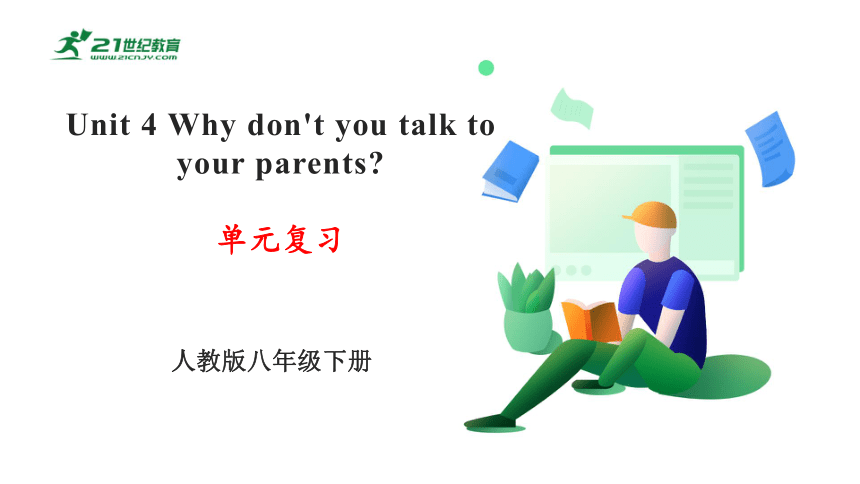 | |
| 格式 | pptx | ||
| 文件大小 | 911.7KB | ||
| 资源类型 | 试卷 | ||
| 版本资源 | 人教新目标(Go for it)版 | ||
| 科目 | 英语 | ||
| 更新时间 | 2023-05-31 14:33:01 | ||
图片预览

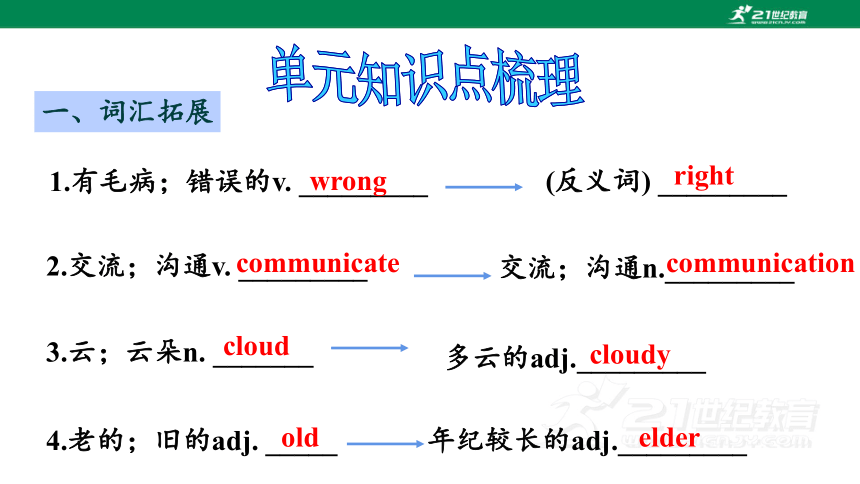

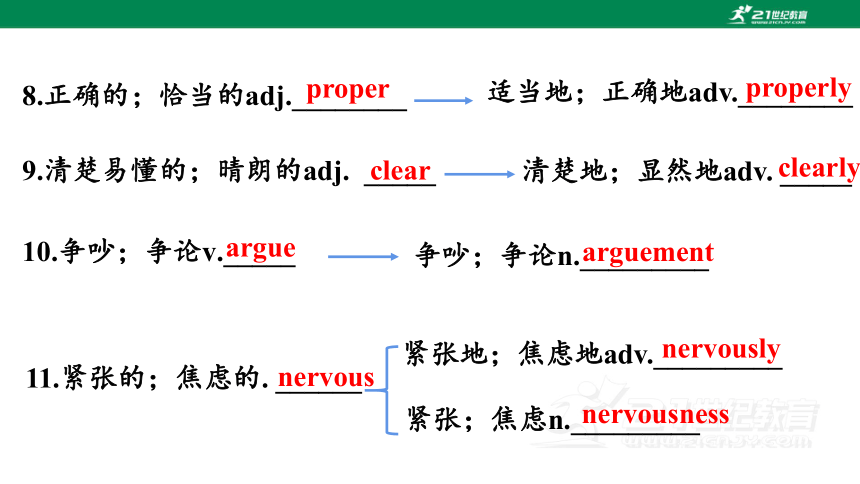
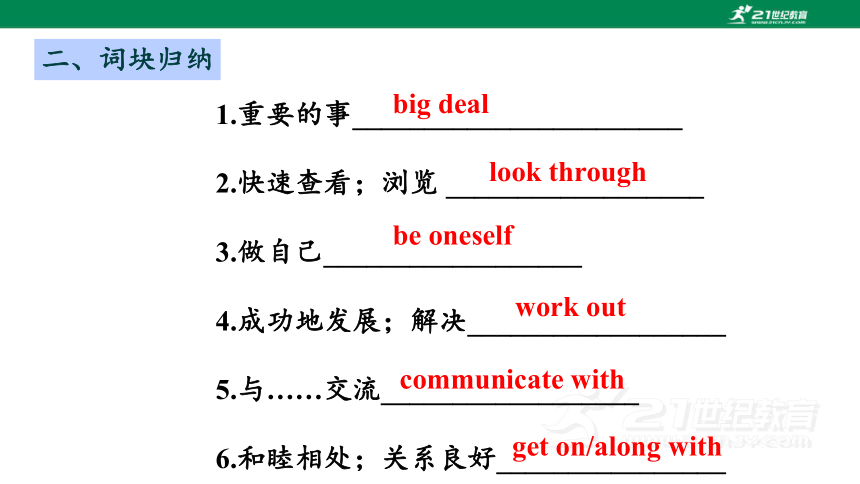
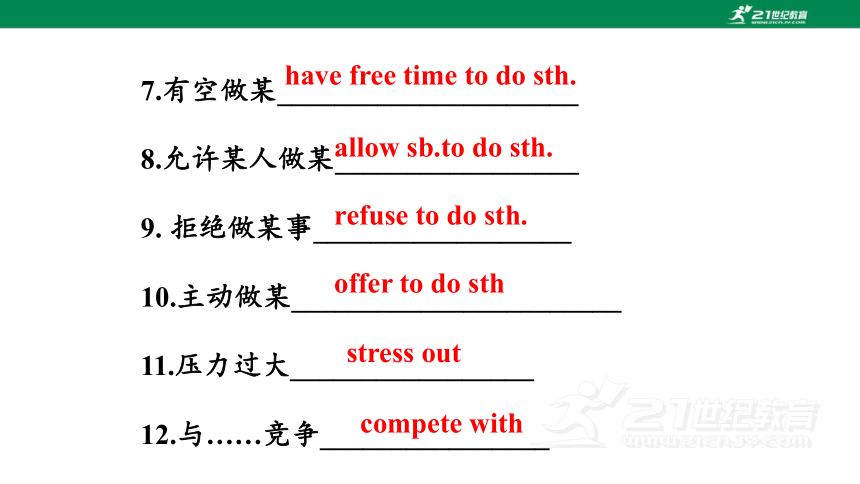
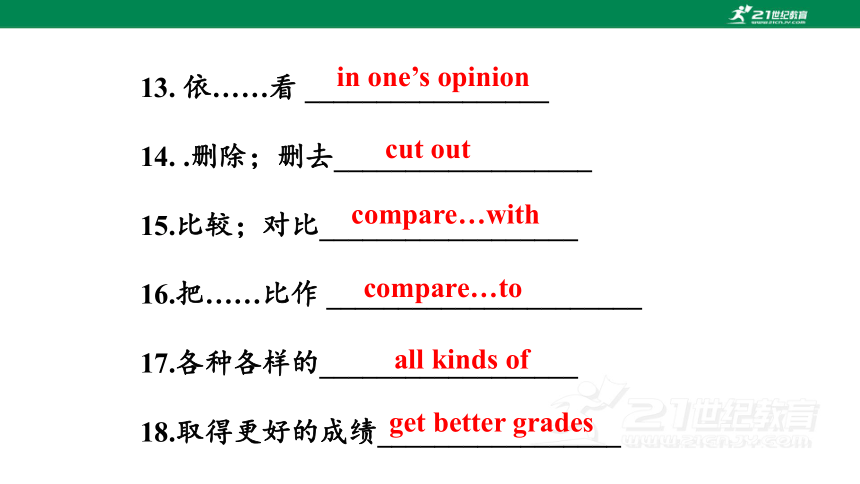
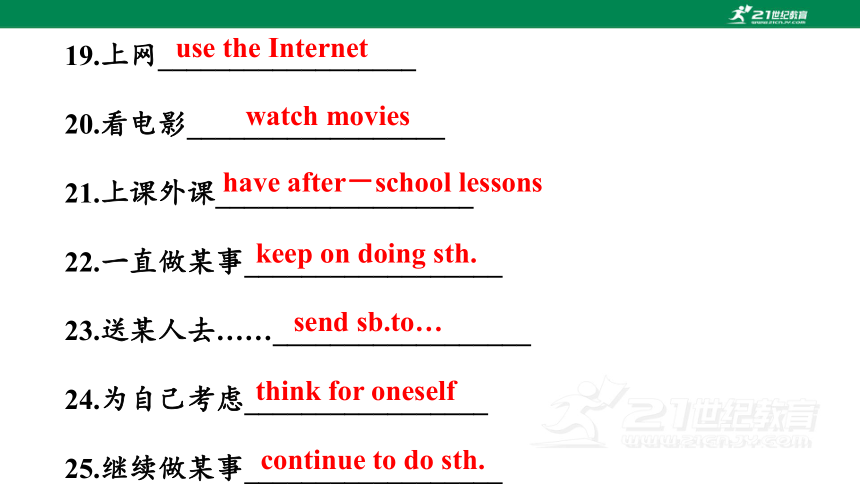
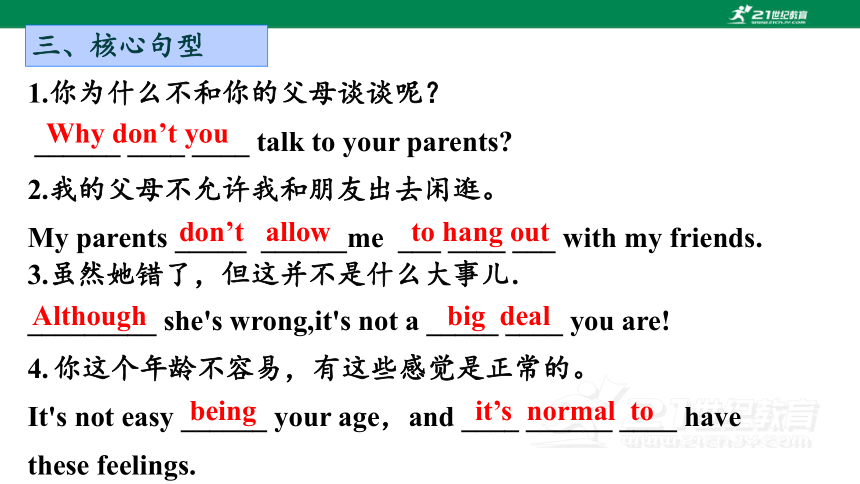
文档简介
(共26张PPT)
Unit 4 Why don't you talk to
your parents
单元复习
人教版八年级下册
单元知识点梳理
一、词汇拓展
单元知识点梳理
1.有毛病;错误的v. _________
交流;沟通n._________
多云的adj._________
年纪较长的adj._________
2.交流;沟通v. _________
3.云;云朵n. _______
4.老的;旧的adj. _____
wrong
communicate
communication
cloud
cloudy
old
elder
right
(反义词) _________
比赛;竞赛n. _________
(反义词)_______________
通常地;一般地adv.________
5.竞争;对抗v._________
6.通常的;寻常的adj._________
compete
competition
usual
unusual
usually
(基数词)_________
第二;其次adv._________
7.第二num. _____
two
secondly
second
参赛者;竞赛者n. _________
competitor
9.清楚易懂的;晴朗的adj. _____
清楚地;显然地adv. _____
紧张地;焦虑地adv._________
10.争吵;争论v._____
11.紧张的;焦虑的. ______
clear
argue
nervous
nervously
clearly
争吵;争论n._________
arguement
紧张;焦虑n._________
nervousness
8.正确的;恰当的adj.________
适当地;正确地adv.________
proper
properly
二、词块归纳
1.重要的事_______________________
2.快速查看;浏览 __________________
3.做自己__________________
4.成功地发展;解决__________________
5.与……交流__________________
6.和睦相处;关系良好________________
big deal
look through
be oneself
work out
communicate with
get on/along with
7.有空做某_____________________
8.允许某人做某_________________
9. 拒绝做某事__________________
10.主动做某_______________________
11.压力过大_________________
12.与……竞争________________
have free time to do sth.
allow sb.to do sth.
refuse to do sth.
offer to do sth
stress out
compete with
13. 依……看 _________________
14. .删除;删去__________________
15.比较;对比__________________
16.把……比作 ______________________
17.各种各样的__________________
18.取得更好的成绩_________________
in one’s opinion
cut out
compare…with
compare…to
all kinds of
get better grades
19.上网__________________
20.看电影__________________
21.上课外课__________________
22.一直做某事__________________
23.送某人去……__________________
24.为自己考虑_________________
25.继续做某事__________________
use the Internet
watch movies
have after-school lessons
keep on doing sth.
send sb.to…
think for oneself
continue to do sth.
三、核心句型
1.你为什么不和你的父母谈谈呢?
______ ____ ____ talk to your parents
2.我的父母不允许我和朋友出去闲逛。
My parents _____ ______me ___ ____ ___ with my friends.
3.虽然她错了,但这并不是什么大事儿.
_________ she's wrong,it's not a _____ ____ you are!
4. 你这个年龄不容易,有这些感觉是正常的。
It's not easy ______ your age,and ____ ______ ____ have these feelings.
Why don’t you
don’t allow
to hang out
Although
big deal
being
it’s normal to
5.相反,他想看什么就看什么,一直到深夜
______ he watches _________he wants ______ late at night.
6.其他孩子为了能参加竞赛并获胜而在参加体育训练 .
Others ____ _________ sports____ _____ they can compete and win.
7.然而,疲惫的孩子们直到晚上7点以后才回到家。
However, the tired children ____ ____ ____ _____ after 7:00 p.m.
8.他们很快吃完晚饭,接着就该做作业了。
They have a quick dinner,and then it's ____ ____ homework.
Instead
whatever
until
are practicing
so that
don’t get home until
time for
9.他们总是把他们和别的孩子进行对比。
They ____ _______ ___________ _____ with other children.
10.尽管想要孩子成功很正常,但更重要的是让孩子快乐。
Although it's normal __ ____ successful children, it's _____ ___ _________ to have happy children.
11.孩子们应该有时间来放松,也(应该有时间来)为他们自己考虑。
Kids should have time ___ ____ and ____ ___ ___________ too.
are always comparing them
to want
even more
important
to relax
think for themselves
1、My parents don't allow me to hang out with my friends.
我父母不允许我和我的朋友们闲逛。
①allow sb.to do sth.允许某人做某事
My mother doesn't allow me to use a smart phone.
妈妈不允许我用手机。
②allow doing sth.允许做某事
We don't allow running in the hallways.
我们不允许在走廊里奔跑。
③be allowed to do sth.被允许做某事
Teenagers are allowed to make their own decisions.
青少年被允许自己做决定。
四、重难知识点归纳
2、Well,I found my sister looking through my things yesterday.
嗯,昨天我发现我妹妹在翻看我的东西。
find sb.doing sth.意为“发现某人正在做某事”,
强调动作正在进行。
find sb.do sth. “发现某人做了某事”。
有类似用法的词还有watch,see,hear等。
look through意为“快速查看;浏览”。
【同类归纳】与look相关的短语:
look at看 look for寻找
look up查阅 look after照料;照顾
look around环顾 look forward to盼望;期待
3、Hope things work out.希望事情会好起来。
work out“解决;成功地发展”跟fine,well,badly等。
Everything is working out well.一切都很顺利。
【拓展延伸】work out的其他用法:
①计算出(答案、数量、价格等)
The math problem is too difficult for me to work out.
这道数学题对我来说太难了,我算不出。
②制订出(计划等)
I have worked out a new way of doing it.
我已制订出一种做这件事的新方法。
③解决;找出……的答案
The government has many problems to work out.
政府有许多问题要解决。
4、My problem is that I can't get on with my family.
我的问题是我和家人的关系不好。
本句是“主系表”结构,其中that I can't get on with my family是表语从句。表语从句与宾语从句一样,要用陈述语序。
表语从句的引导词有that, what, when, why, how等,其中that常可以省略。
e.g.That is what we need.这就是我们所需要的。
That's what I want to tell you.这就是我想告诉你的。
The trouble is that I forget her name.麻烦的是我忘记她的名字了。
5、It’s not easy being your age,and it’s normal to have these feelings.
处在你这个年龄是不容易的,有这样的情绪很正常。
此处两个it做形式主语,不定式短语作真正的主语,动名词短语作真正的主语,本句整体为and连接的两个并列句。除了and之外,可有相同用法的连词还有but,or等。
e.g.I like to go to study in the school, but I don't like to get up early everyday.
我喜欢去学校学习,但是我不喜欢每天早起。
offer 侧重表示“主动提出;自愿给予”。 offer sb.sth.=offer sth.to sb.向某人提供某物
offer to do sth.
主动提出做某事
provide 指为应付意外、紧急情况等做好充分准备而“供给、提供”。 provide sb.with sth.
=provide sth.for sb.给某人提供某物
6、If your parents are having problems,you should offer to help. 如果你的父母遇到问题,你应该主动提供帮助。
offer to do sth.是固定结构,意为“主动提出做某事”。
【易混辨析】offer与provide
compare…with… 把……和……比较 强调同类相比,从而发现不同之处。
compare…to… 把……比作…… 强调异类相比,用来说明两个事物之间的相同之处。
7、And they are always comparing them with other children.
而且他们总是拿自己的孩子和别的孩子相比。
compare…with…意为“把……和……比较”。
【易混辨析】compare…with…与compare…to…
8、Dr.Alice Green says all these activities can cause a lot of stress for children.
爱丽丝·格林医生说,所有这些活动会给孩子造成很大压力。
cause的用法
9、You could tell him to turn down the TV.
你可以告诉他把电视音量调低。
turn down意为“关小;调低(音量)”。是由“动词+副词”构成的短语,代词作宾语时,代词必须放在turn和down之间。
【拓展延伸】 ①turn down还有“拒绝”的意思。
②与turn相关的短语:
turn up调高(音量等) turn on打开(电、煤气、水等)
turn off关掉(电、煤气、水等) turn up出现
turn out产生;结果是 turn over翻阅;把……翻过来
一、表建议的句型
1.Why don't you do sth. = Why not do sth. 你为什么不做某事?
2.Shall we do sth. 我们做某事好吗?
3.Let's do sth. 让我们做某事吧。
4.You/We had better do sth. 你(们)/我们最好做某事。
5.You/We (not )should do sth. 你(们)/我们(不)应该做某事。
6.You/We could...你(们)/我们可以……
7.Would you like sth. / to do sth. 你想某物/做某事吗?
8.What/How about (doing) sth. (做)某事/某物怎么样?
五、单元语法点回顾
否定回答:I don't think so.
/Sorry, I can’t.
I'd love / like to, but ……
I'm afraid...
What a pity! I have to ……
肯定回答:
Good idea. /That's a good idea. /Sounds good / great.
OK. / All right. / Sure. / Of course. / Certainly.. / No problem
Yes, please. /I'd love to. /I'd like to.
/I can't agree more. /Yes, I think so.
回答建议的句型
二、until/although/until引导的状语从句
1. until作连词,意为“直到”,引导时间状语从句。
①主句是肯定句时,其谓语用延续性动词,强调主句的动作或状态一直持续到从句的动作发生时为止,译成“直到……为止”。
②主句是否定句时,其谓语用非延续性动词,强调主句的动作在从句的动作发生之后才开始,一般译成“直到……才……”。
so that意为“为了,以便”,引导目的状语从句,相当于in order that,从句中多含有can, could, may, might等情态动词。
【拓展延伸】so that还可引导结果状语从句,意为“因此;所以”,此时从句中通常不含情态动词。
although意为“尽管;然而”,引导让步状语从句,
相当于though。
【注意】although或though不能与but用在同一个句子中,但可以与yet, still同时使用。
谢谢
21世纪教育网(www.21cnjy.com)
中小学教育资源网站
兼职招聘:
https://www.21cnjy.com/recruitment/home/admin
Unit 4 Why don't you talk to
your parents
单元复习
人教版八年级下册
单元知识点梳理
一、词汇拓展
单元知识点梳理
1.有毛病;错误的v. _________
交流;沟通n._________
多云的adj._________
年纪较长的adj._________
2.交流;沟通v. _________
3.云;云朵n. _______
4.老的;旧的adj. _____
wrong
communicate
communication
cloud
cloudy
old
elder
right
(反义词) _________
比赛;竞赛n. _________
(反义词)_______________
通常地;一般地adv.________
5.竞争;对抗v._________
6.通常的;寻常的adj._________
compete
competition
usual
unusual
usually
(基数词)_________
第二;其次adv._________
7.第二num. _____
two
secondly
second
参赛者;竞赛者n. _________
competitor
9.清楚易懂的;晴朗的adj. _____
清楚地;显然地adv. _____
紧张地;焦虑地adv._________
10.争吵;争论v._____
11.紧张的;焦虑的. ______
clear
argue
nervous
nervously
clearly
争吵;争论n._________
arguement
紧张;焦虑n._________
nervousness
8.正确的;恰当的adj.________
适当地;正确地adv.________
proper
properly
二、词块归纳
1.重要的事_______________________
2.快速查看;浏览 __________________
3.做自己__________________
4.成功地发展;解决__________________
5.与……交流__________________
6.和睦相处;关系良好________________
big deal
look through
be oneself
work out
communicate with
get on/along with
7.有空做某_____________________
8.允许某人做某_________________
9. 拒绝做某事__________________
10.主动做某_______________________
11.压力过大_________________
12.与……竞争________________
have free time to do sth.
allow sb.to do sth.
refuse to do sth.
offer to do sth
stress out
compete with
13. 依……看 _________________
14. .删除;删去__________________
15.比较;对比__________________
16.把……比作 ______________________
17.各种各样的__________________
18.取得更好的成绩_________________
in one’s opinion
cut out
compare…with
compare…to
all kinds of
get better grades
19.上网__________________
20.看电影__________________
21.上课外课__________________
22.一直做某事__________________
23.送某人去……__________________
24.为自己考虑_________________
25.继续做某事__________________
use the Internet
watch movies
have after-school lessons
keep on doing sth.
send sb.to…
think for oneself
continue to do sth.
三、核心句型
1.你为什么不和你的父母谈谈呢?
______ ____ ____ talk to your parents
2.我的父母不允许我和朋友出去闲逛。
My parents _____ ______me ___ ____ ___ with my friends.
3.虽然她错了,但这并不是什么大事儿.
_________ she's wrong,it's not a _____ ____ you are!
4. 你这个年龄不容易,有这些感觉是正常的。
It's not easy ______ your age,and ____ ______ ____ have these feelings.
Why don’t you
don’t allow
to hang out
Although
big deal
being
it’s normal to
5.相反,他想看什么就看什么,一直到深夜
______ he watches _________he wants ______ late at night.
6.其他孩子为了能参加竞赛并获胜而在参加体育训练 .
Others ____ _________ sports____ _____ they can compete and win.
7.然而,疲惫的孩子们直到晚上7点以后才回到家。
However, the tired children ____ ____ ____ _____ after 7:00 p.m.
8.他们很快吃完晚饭,接着就该做作业了。
They have a quick dinner,and then it's ____ ____ homework.
Instead
whatever
until
are practicing
so that
don’t get home until
time for
9.他们总是把他们和别的孩子进行对比。
They ____ _______ ___________ _____ with other children.
10.尽管想要孩子成功很正常,但更重要的是让孩子快乐。
Although it's normal __ ____ successful children, it's _____ ___ _________ to have happy children.
11.孩子们应该有时间来放松,也(应该有时间来)为他们自己考虑。
Kids should have time ___ ____ and ____ ___ ___________ too.
are always comparing them
to want
even more
important
to relax
think for themselves
1、My parents don't allow me to hang out with my friends.
我父母不允许我和我的朋友们闲逛。
①allow sb.to do sth.允许某人做某事
My mother doesn't allow me to use a smart phone.
妈妈不允许我用手机。
②allow doing sth.允许做某事
We don't allow running in the hallways.
我们不允许在走廊里奔跑。
③be allowed to do sth.被允许做某事
Teenagers are allowed to make their own decisions.
青少年被允许自己做决定。
四、重难知识点归纳
2、Well,I found my sister looking through my things yesterday.
嗯,昨天我发现我妹妹在翻看我的东西。
find sb.doing sth.意为“发现某人正在做某事”,
强调动作正在进行。
find sb.do sth. “发现某人做了某事”。
有类似用法的词还有watch,see,hear等。
look through意为“快速查看;浏览”。
【同类归纳】与look相关的短语:
look at看 look for寻找
look up查阅 look after照料;照顾
look around环顾 look forward to盼望;期待
3、Hope things work out.希望事情会好起来。
work out“解决;成功地发展”跟fine,well,badly等。
Everything is working out well.一切都很顺利。
【拓展延伸】work out的其他用法:
①计算出(答案、数量、价格等)
The math problem is too difficult for me to work out.
这道数学题对我来说太难了,我算不出。
②制订出(计划等)
I have worked out a new way of doing it.
我已制订出一种做这件事的新方法。
③解决;找出……的答案
The government has many problems to work out.
政府有许多问题要解决。
4、My problem is that I can't get on with my family.
我的问题是我和家人的关系不好。
本句是“主系表”结构,其中that I can't get on with my family是表语从句。表语从句与宾语从句一样,要用陈述语序。
表语从句的引导词有that, what, when, why, how等,其中that常可以省略。
e.g.That is what we need.这就是我们所需要的。
That's what I want to tell you.这就是我想告诉你的。
The trouble is that I forget her name.麻烦的是我忘记她的名字了。
5、It’s not easy being your age,and it’s normal to have these feelings.
处在你这个年龄是不容易的,有这样的情绪很正常。
此处两个it做形式主语,不定式短语作真正的主语,动名词短语作真正的主语,本句整体为and连接的两个并列句。除了and之外,可有相同用法的连词还有but,or等。
e.g.I like to go to study in the school, but I don't like to get up early everyday.
我喜欢去学校学习,但是我不喜欢每天早起。
offer 侧重表示“主动提出;自愿给予”。 offer sb.sth.=offer sth.to sb.向某人提供某物
offer to do sth.
主动提出做某事
provide 指为应付意外、紧急情况等做好充分准备而“供给、提供”。 provide sb.with sth.
=provide sth.for sb.给某人提供某物
6、If your parents are having problems,you should offer to help. 如果你的父母遇到问题,你应该主动提供帮助。
offer to do sth.是固定结构,意为“主动提出做某事”。
【易混辨析】offer与provide
compare…with… 把……和……比较 强调同类相比,从而发现不同之处。
compare…to… 把……比作…… 强调异类相比,用来说明两个事物之间的相同之处。
7、And they are always comparing them with other children.
而且他们总是拿自己的孩子和别的孩子相比。
compare…with…意为“把……和……比较”。
【易混辨析】compare…with…与compare…to…
8、Dr.Alice Green says all these activities can cause a lot of stress for children.
爱丽丝·格林医生说,所有这些活动会给孩子造成很大压力。
cause的用法
9、You could tell him to turn down the TV.
你可以告诉他把电视音量调低。
turn down意为“关小;调低(音量)”。是由“动词+副词”构成的短语,代词作宾语时,代词必须放在turn和down之间。
【拓展延伸】 ①turn down还有“拒绝”的意思。
②与turn相关的短语:
turn up调高(音量等) turn on打开(电、煤气、水等)
turn off关掉(电、煤气、水等) turn up出现
turn out产生;结果是 turn over翻阅;把……翻过来
一、表建议的句型
1.Why don't you do sth. = Why not do sth. 你为什么不做某事?
2.Shall we do sth. 我们做某事好吗?
3.Let's do sth. 让我们做某事吧。
4.You/We had better do sth. 你(们)/我们最好做某事。
5.You/We (not )should do sth. 你(们)/我们(不)应该做某事。
6.You/We could...你(们)/我们可以……
7.Would you like sth. / to do sth. 你想某物/做某事吗?
8.What/How about (doing) sth. (做)某事/某物怎么样?
五、单元语法点回顾
否定回答:I don't think so.
/Sorry, I can’t.
I'd love / like to, but ……
I'm afraid...
What a pity! I have to ……
肯定回答:
Good idea. /That's a good idea. /Sounds good / great.
OK. / All right. / Sure. / Of course. / Certainly.. / No problem
Yes, please. /I'd love to. /I'd like to.
/I can't agree more. /Yes, I think so.
回答建议的句型
二、until/although/until引导的状语从句
1. until作连词,意为“直到”,引导时间状语从句。
①主句是肯定句时,其谓语用延续性动词,强调主句的动作或状态一直持续到从句的动作发生时为止,译成“直到……为止”。
②主句是否定句时,其谓语用非延续性动词,强调主句的动作在从句的动作发生之后才开始,一般译成“直到……才……”。
so that意为“为了,以便”,引导目的状语从句,相当于in order that,从句中多含有can, could, may, might等情态动词。
【拓展延伸】so that还可引导结果状语从句,意为“因此;所以”,此时从句中通常不含情态动词。
although意为“尽管;然而”,引导让步状语从句,
相当于though。
【注意】although或though不能与but用在同一个句子中,但可以与yet, still同时使用。
谢谢
21世纪教育网(www.21cnjy.com)
中小学教育资源网站
兼职招聘:
https://www.21cnjy.com/recruitment/home/admin
同课章节目录
- Unit 1 What's the matter?
- Section A
- Section B
- Unit 2 I'll help to clean up the city parks.
- Section A
- Section B
- Unit 3 Could you please clean your room?
- Section A
- Section B
- Unit 4 Why don't you talk to your parents?
- Section A
- Section B
- Unit 5 What were you doing when the rainstorm came
- Section A
- Section B
- Review of Units 1-5
- Unit 6 An old man tried to move the mountains.
- Section A
- Section B
- Unit 7 What's the highest mountain in the world?
- Section A
- Section B
- Unit 8 Have you read Treasure Island yet?
- Section A
- Section B
- Unit 9 Have you ever been to a museum?
- Section A
- Section B
- Unit 10 I've had this bike for three years.
- Section A
- Section B
